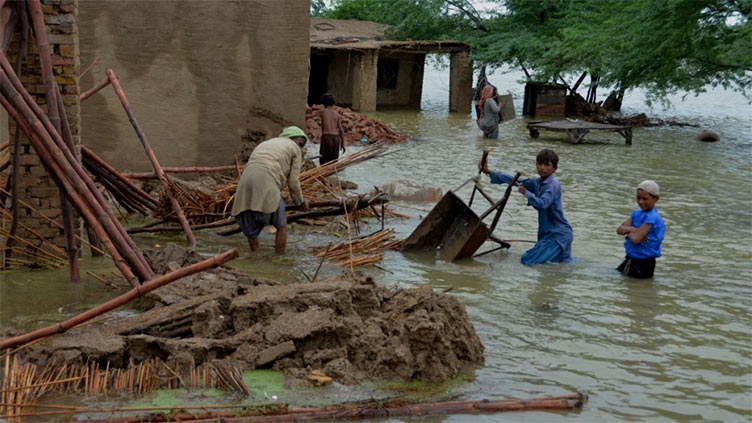Flood devastation leaves communities destitute: Sherry Rehman

Pakistan
Flood devastation leaves communities destitute: Sherry Rehman
ISLAMABAD (Dunya News) - Federal Minister for Climate Change, Senator Sherry Rehman on Monday said the policy discussions should be well-updated to the ground situation as flood devastation left affected communities in Sindh and Balochistan destitute seeking only sustainable livelihoods.
The federal minister was addressing the Donor’s Coordination Group meeting held here by the International Union for Conservation of Nature (IUCN) which was participated by various donors including United Arab Emirates (UAE), French, Italian, Swiss, US, Canada, Japan, The World Bank, UNIDO, UN Women, UNDP. The donors showed their interest in project concepts shared by the IUCN team and collaborations.
Senator Sherry Rehman said the vulnerable who worked most closely with nature was not in a position to stop exploiting it until they had sustainable livelihoods.
“Let’s not talk about Pollyanna sustainable economics. First, we have to get those people on their feet.”
The minister shared that when the government and authorities were providing mosquito nets at the height of water borne diseases and epidemics because of stagnant water below sea level at various locations there was serious lack supplies of mosquito nets.
The government was asking all donors and countries to provide mosquito nets whereas the National Disaster Management Authority (NDMA) and PDMAs were toiling to manage more tents and nets, she added.
The minister underlined that she believed that during those unprecedented testing times not a single person in federal and provincial governments had slept due to massive workload and crisis.
“When we provided mosquito nets to the families during visit to the flood affected areas; what families do was tragic and it was the scale of human tragedy to me. The household started putting the mosquito net on the only one buffalo they had left. That was their guarantee for some predictable income for next few months.”
She added that this was what people’s choices were when they were faced with extreme fragility and when they start seeing their day to day vulnerability. “They just know that they are in a hard scrabble fight in which the elements, the sky, the water and their inability to provide sustainable income was the most important thing.”
The minister said the people needed livelihoods on the ground in Sindh and Balochistan before we ask them to farm or husband water sustainably. “They do that anyway when they have nothing left after climate calamities. Policy discussions must reflect that reality on the ground.”
The minister emphasised on the climate emergency and on rebuilding other than building. She stressed on the devastating floods that caused havoc in Pakistan and the need to have climate empathy among multi-stakeholders with regards to safeguarding the rights of women who were at the forefront most neglected segment.
She appreciated IUCN for always providing well needed technical support. She thanked IUCN Pakistan and all the development partners for their respective contributions and support over the years. She emphasized that MoCC and IUCN has jointly developed the first ever National Climate Change Gender Action Plan (ccGAP) of Pakistan that was a way forward to mainstream gender in the 6 priority sectors impacted due to climate change.
Country Representative, IUCN Pakistan, Mahmood Akhtar Cheema while speaking to the audience gave brief introduction about IUCNs contribution and how this event was themed at IUCNs Nature 2030 goals which included Water, Oceans, Land, People and Climate.
He stressed on collaboration and synergy among working groups working in the climate sector of Pakistan. Mr Cheema also briefed the participants and welcomed them to collectively build climate resilience of those who are most vulnerable to the aftershocks of climate change.
Ambassador of the UAE to Pakistan, Hamad Alzaabi spoke at length about UAE’s contribution in Pakistan with regards to knowledge and job creation and skills training that where they trained women in general on different skills to sustain their income and livelihoods during calamities. He also provided an overview of UAE’s role and preparations for the COP28 and showed interest for working together with IUCN Pakistan and Ministry of Climate Change.

